The mine exploded just a few meters away. “I thought I was already dead,” Lyubov Zarudna recalls of her ordeal in June 2022, “but then, I opened my eyes — I was alive. Blood was everywhere, lips split, tooth knocked out, hit in the neck, chest, leg… If I had taken one more step, there would have been nothing left of me but flesh.”
“When the mine blasted, it was a pile of dust, nothing visible,” adds her husband, Hryhoriy Zarudny, “but then, I look, and there she stands – alive and kicking.” The blast wave was very strong; Lyubov’s head rang for a long time afterwards, and a black bruise appeared on her chest. However, the woman was incredibly lucky. Not just because, at the last moment, she covered her eyes with her hand. The wounds from the shrapnel that was embedded in her body were not deep. Lyuba [short for ‘Lyubov’ – ed.] treated them as best she could with antiseptic, rinsed them, stopped the bleeding, and even squeezed out some of the fragments herself. The rest, she says, were removed later in the hospital.
The explosion happened right before they were about to leave their village, as if it was a warning that it was time to flee because it wasn’t going to end well. They could have left earlier, but they had no way to do it. Everyone who had their own vehicle had already left. Those who didn’t have a way to go were taken out by soldiers. However, the occupiers quickly zeroed in on the evacuation vehicle, and everything went silent. People hid in basements while the intensity of the fighting kept escalating. Soldiers kept promising to come up with something to get the elderly out, but nothing worked out. When Lyuba and Hryhoriy finally got out, it turned out that they were the last residents of the village lucky enough to be evacuated. Their three fellow villagers who stayed behind never managed to survive the full-scale war.
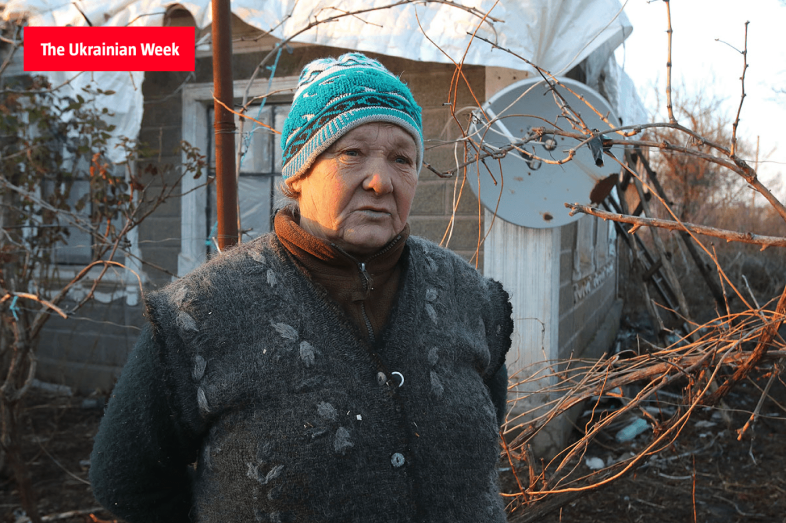
Photo: Roman Malko
Bila Krynytsia is a small village nestled on the very edge of the Mykolaiv region, in southern Ukraine. It sprawls in the valley along the picturesque banks of the Inhul River, with its waters embracing three sides of the village. Before the tragic day of February 24, 2022, around three hundred residents called this place their home. Everyone was busy with their daily routine, with plenty of work to keep them occupied. The school was up and running, a kindergarten welcomed the laughter of children, and there was a farm and a greenhouse complex where one could find employment, whether in planting or harvesting vegetables. There was also work available at the recreation centre, hidden in the pine forest just beyond the village.
Now, all of that lies in ruins: the farm, the greenhouses, and the recreation centre, all consumed by fire along with the forest. Not a single house in the village remains unscathed. Even on Google Maps, where the images of these places are not very clear, it’s hard to miss the devastating impact on the land. The scars of ruins and craters mar the once serene landscape. In just eight months of the war, this paradise corner was transformed into a stark ruin, leaving uncertainty about whether it will ever flourish again.
The occupiers quickly seized the neighbouring Kherson region, but in the Mykolaiv region, their ‘victorious’ march was halted, forcing them to retreat. For a while, Bila Krynytsia even found itself under occupation, but fortunately, it did not last long. The village remained in the so-called grey zone, out of control and unclaimed by anyone, for quite some time.
The Russian occupation forces arrived here for the first time as they advanced towards Mykolaiv. Three tanks detached from the column, moving along the road, and set off for reconnaissance. With no Ukrainian forces in the village, the occupiers immediately asserted their dominance. They claimed to be searching for deserters and began rummaging through the yards. “Groups of 10-15 armed men,” recalls Lyuba, “sneaked from yard to yard, peeking inside. If a house was locked because the owners had fled, they kicked down the doors and went in.” A few weeks later, they returned with two Beterei vehicles and a so-called “bukhanka” [a Soviet microbus – ed.]; this time, Russians came to loot. “They took a boat from here, dismantled a car over there because they knew there were no locals here.”
Local residents were immediately warned to steer clear of the river. “If you want to live, it’s better to stay away,” they were told by the Russians. However, the warning seemed excessive to some. Some were accustomed to grazing cattle on the banks, while others had gardens that stretched almost to the river. But the occupiers were dead serious. One of the first Russian strikes hit near a neighbour’s house while the owner was tending to the garden by the river. The mine landed in the yard, scattering everything around. It ripped open the belly of the shepherd dog, and in the barn, an explosion sheared off the cow’s tail and killed two hens and a rooster. “They gave him a warning, you see,” recalls Lyuba, “but he didn’t pay heed, so this was the result.”

Photo: Roman Malko
“See there, just beyond the garden where the greenery stops,” Hryhoriy gestures, “that’s where Russians had the mortar set up. I was pulling grass for the rabbits in the garden, and they were sitting there, watching, ready to shoot. About six meters away—bang. I crawl away from there, and they’re hovering over me [with a copter – ed.] as if they found it entertaining. I left my bicycle near the beehives, just about five meters away. I managed to reach for it, and then another explosion came, this time right behind me. I hit between hives and completely scattered them – they were covered in mud so thick that the bees couldn’t even fly out the next day.”
The house where Hryhoriy and Lyuba live now was given to their children before the war, so the couple moved back to their parents’ house. When the heavy shelling started, the children took their little ones and fled to the Odesa region, leaving the grandparents to tend to their abandoned farmstead. They had four cows, a bull, three young bulls, a heifer, two pigs, a boar, six goats, a couple dozen ducks, seventy chickens, and twenty rabbits. When they returned, all they found left was the cat, who even had a broken tail. But she immediately brought the owners two kittens, and soon after, another three, as if she was taking it upon herself to rebuild the farm,” Hryhoriy jokes.
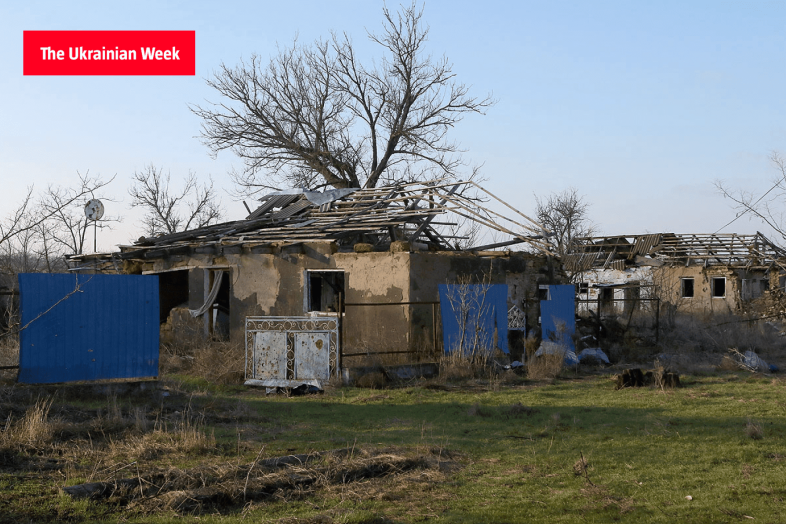
Photo: Roman Malko
“Our [Ukrainian – ed.] troops arrived in Bila Krynytsia unexpectedly, just around the summer. Initially, small sabotage groups infiltrated, and soon after, the village found itself right on the front line. The moskals [slang for ‘Russian’ – ed.] entrenched themselves behind the Inhul River, and our troops were on this side,” Lyuba recounts. “There were fierce battles here; many of our soldiers fell during the crossing.”
“The occupiers buried tanks in the villages, leaving only the barrels exposed so they could fire,” she continues. “Then they bombarded us from helicopters and those cluster bombs. Everything was flying around. Over there, by the river bend, when something exploded – a column of fire was followed by a mushroom cloud. Only God knows what kind of shells those were. We thought a nuclear war had already broken out.”
“Sometimes we didn’t even know who was shooting at whom,” the woman recalls, “they were firing mortars from the forest,” she gestures towards the other side, “and both there and here, it’s the Kherson region and the occupiers. When they started shooting from that direction, we wondered if they were shooting at their own people. It turned out our troops had advanced a bit there. They say there were so many strikes, like 86, but we couldn’t keep count. We just couldn’t fall asleep anymore when the shooting stopped. So, we’d lie down in the evening, lying there, and they’re not shooting. What’s going on, why aren’t they shooting? It seems they’re having dinner. Then we hear the hum, their vehicle arrives, and so it begins…”
“Amidst all that chaos, people sought refuge in basements—some in their own, some in neighbours”. “As soon as the gunfire ceased,” Lyuba remembers, “we hurried to fetch water, cooked whatever we could, maybe some milk, eggs, or whatever we could find, and just huddled together.”
The elderly couple remained in their cellar until a mine struck, blowing off the entrance. After that, they sought shelter in a small village bomb shelter. “To be honest,” Hryhoriy admits, “I wasn’t keen on hiding at first, no matter how much Lyuba pleaded. “The house would tremble, you’d think it might collapse, yet somehow you’d still doze off because you gradually get used to it, especially when you’re exhausted,” explains Hryhoriy. It wasn’t until he ventured into the yard and a piece of shrapnel landed nearby that he grew fearful. “That’s when I heeded her plea and went to the bomb shelter.” And it turned out to be a wise decision. “Right where I was lying, only springs jut out now. There’s nothing left of the house. Russian bomb landed right at it.”
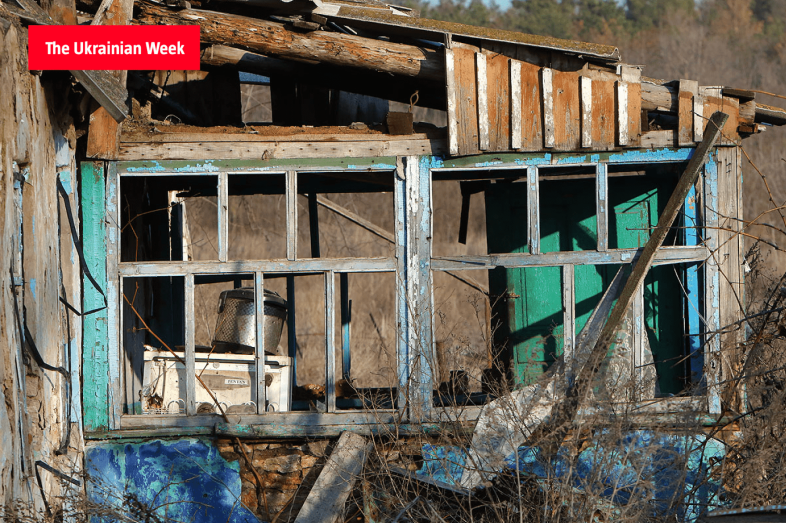
Photo: Roman Malko
When the blast hit the house of an eighty-year-old grandmother next door, she crawled in fear to the neighbours’ yard and sought refuge in their hayloft among the sheaves. She remained there for four days, unable to get out for water or food. A fellow villager, who was tending to the pigs nearby and heard her moans, eventually found her.
They managed to pull her out, gave her water and the necessary medication, and she, utterly exhausted, fell into a deep sleep. Sadly, she never woke up again. Her frail body couldn’t bear the strain. They laid her to rest at home in the garden, opting against the risk of carrying her to the cemetery. And there she remains at peace. As for the man who found her, a Russian bomb would later tear him apart. Ukrainian soldiers collected what little remained, bagged it up, and buried him in the garden. It would only be after everything had concluded that the man’s nephews would return to the village, dig him up, take their father for exhumation to Mykolaiv, and finally lay him to rest properly.
Another elderly lady, Tamara, will later be torn to pieces literally near Lyuba’s and Hryhoriy’s house. Maybe it was when a Russian shell hit the house, maybe later. Around the ruins, the owners counted as many as 13 craters from Russian mines. They recognised Grandma Tamara, they say, by her grey hair; everything else obliterated. A neighbour found her, gathered whatever he could in a sack, and buried her right in the crater.
The Zarudny couple managed to escape from the chaos only in June, right in the midst of the intense fighting. Once again, the soldiers made promises about a vehicle coming to pick them up, but people had lost faith. Then, a few days later, precisely on Trinity Sunday, a soldier arrived and announced, “I will find you a transport right away, and we will get you out of here.”
“He was from Skadovsk,” Lyuba recalls, “His name is Vitya; I didn’t ask for his last name. He stumbled upon a broken-down Hyundai abandoned by its owner. The doors wouldn’t shut, no windows or mirrors, and the radiator was punctured. He welded the radiator, fixed the wheel, got the car running, moved it closer, and said, “In 2 hours, I’ll signal for fire. Otherwise, we won’t make it, Russians are shelling constantly. Our people will be firing at them, and during that time, we have to get through.” We had an 80-year-old elderly lady with us, so we seated her next to my husband. The boys lay on the floor, and I was by the door, holding it tight. And off we went, racing away. He said we won’t be driving, we’ll be flying. In a nutshell, we managed to break free. Surprisingly, Russians didn’t even shoot at us.”
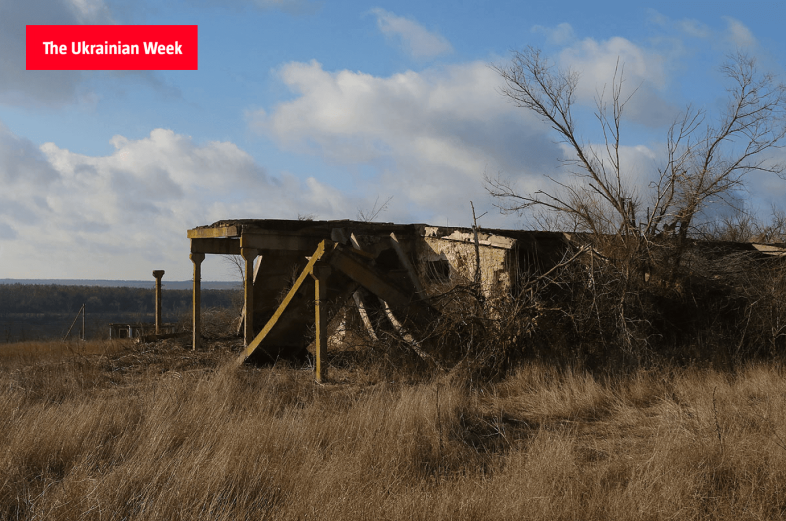
Photo: Roman Malko
Next came the hospital, where they extracted shrapnel and administered antibiotics. However, when the influx of wounded soldiers began, the son phoned his grandfather’s nephew, who then took the relatives to his place in Kryvyi Rih. The couple returned to the village only in the spring of 2023. “The initial sight of what we saw was simply shocking,” the woman recounts. They wandered amidst the wreckage of their home, tears flowing freely; there was nothing salvageable left. The children’s house had fared a bit better, so they took up residence there. Yet, there was an abundance of tasks awaiting them. The roof was leaking, the ceiling had caved in, the pigsties overturned, and the windows shattered. They spent their first night on a child’s bed—the only one left to lie on. It was a night of torrential rain, biting cold, without blankets or pillows; they wrapped themselves in coats and somehow endured till morning. “Later, my son mentioned that in the neighbour’s cellar, where they had sought refuge, our pillows and blankets were there. I retrieved them, gave them a quick wash, and that was that.”
They gradually put things in order, although it wasn’t easy. “I somehow patched up one side of the house with Grandpa [with Hryhoriy – ed.],” shares Lyuba, “but when it came to removing the asbestos, you could probably hear our curses and shouts in the neighbouring village. Because he couldn’t lift it, and I couldn’t pull it. Or I handed it to him, and he couldn’t pull it. But he couldn’t resist, his leg was hurting.” The funniest part of this story is that Hryhoriy had covered almost half the village with asbestos, but when it came to repairing their own house, he had no strength left. By the way, throughout the year, the couple managed to gather quite a bit of asbestos for a new roof. The village council allocated some, they bought some with financial aid, and some was brought by volunteers. “Now, if only someone could help to cover the house with that asbestos, it would be great,” they say.
In the summer, even the grandchildren came to visit Lyuba and Hryhoriy for a whole month. They helped Lyuba water the tomatoes. They can’t wait for summer to arrive again. Then, across the river, the forest was burning, and the ammunition left by the Russian occupiers was exploding. “When the bullets were exploding, it was like a shootout,” says Hryhoriy, “but when the grenades and mines were exploding, the kids were very scared. I told them not to worry, it won’t reach us here.”
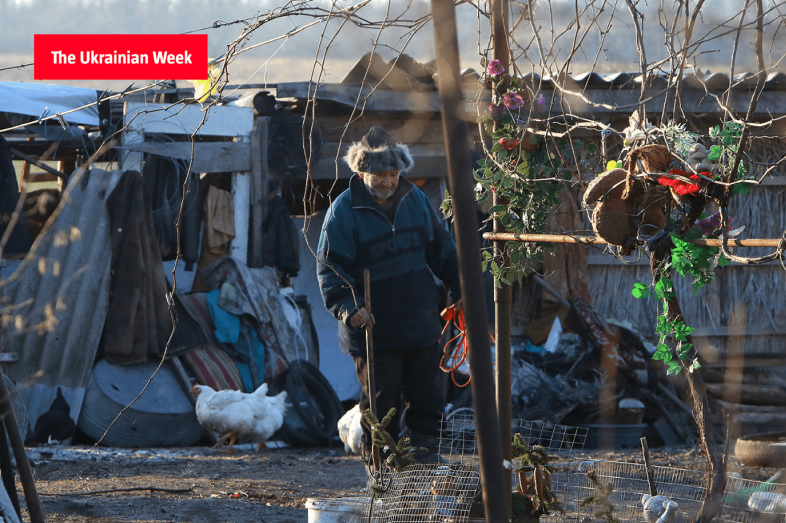
Photo: Roman Malko
If we believe generic information found on Wikipedia, Bila Krynytsia was founded in 1922. Hryhoriy, though, insists that this is not true; the village is much older. “There was an estate in the ravine, where the local lord lived, our great-grandfathers and great-grandmothers worked for him, and here they were building.” Today, about 50 people live in Bila Krynytsia. Many former residents do not want to return because everything here has been destroyed. Quite a few of them have already bought houses in the region’s bigger towns or neighbouring, less devastated villages.
“There probably won’t be a village here anymore,” sighs Hryhoriy, who was born in Bila Krynytsia. “It’s a pity, of course. There won’t be any work for us, and there’s no one to do it, just retirees. Some people came, fixed up the old summer kitchens, and live in them now.”
“When we returned, I said, we’ll stay here,” adds Lyuba, “Let come what may. It can’t be worse than it was, that’s for sure.”
“And I definitely won’t go to the city,” Hryhoriy smiles. In his fox fur hat, Grandpa resembles a Nogai, a Tatar mounted warrior, an inhabitant of these lands from four centuries ago. He’d still like to be put on a horse and gallop off. “I had a hat made of mink fur,” he says, “neat, warm, but it burned in the house. Everything burned there.”
While we converse, in the distance to the east, the rumble of cannonades echoes. Somewhere, fierce battles are raging in Krynyky on the left bank of the Kherson region. “It’s about fifty kilometres to the Dnipro River,” explains Hryhoriy, “but it’s all steppe fields; that’s why you can hear it.” “And when those Russian missiles fly so low,” Lyuba adds, “I think — well, that’s it, it’s going to explode. They have an air corridor here. And rockets fly here. Now we’re frightened when something appears in the skies.”

